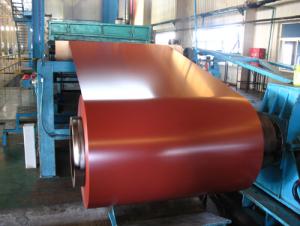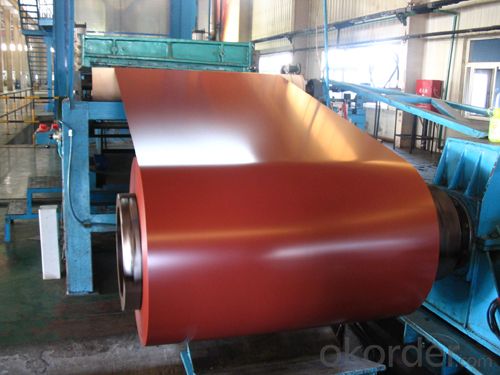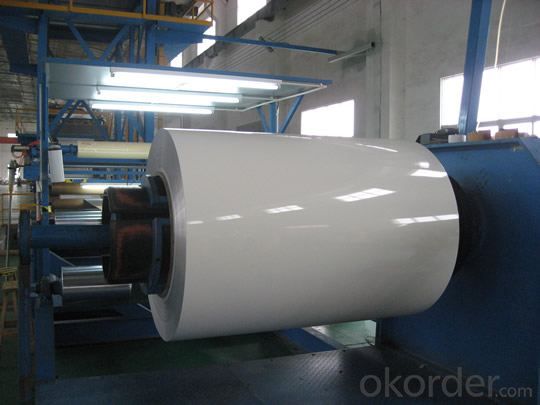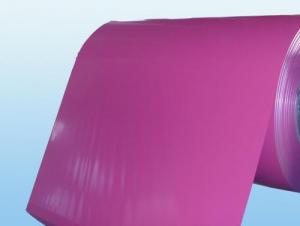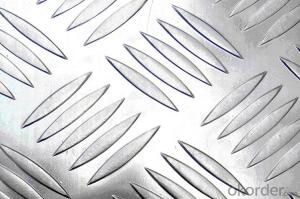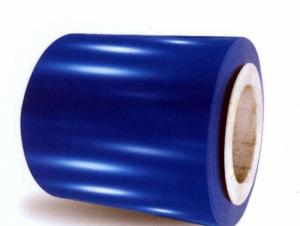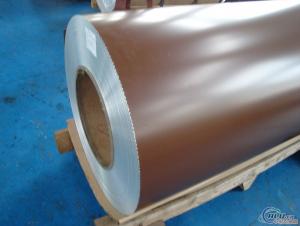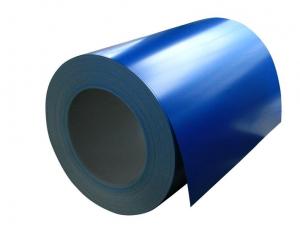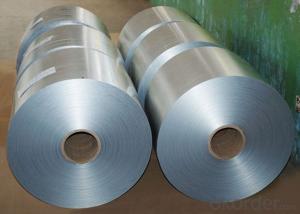Custom Aluminum Coil - PE Color Coated Aluminium Coil AA3003 H14
- Loading Port:
- China Main Port
- Payment Terms:
- TT or LC
- Min Order Qty:
- -
- Supply Capability:
- -
OKorder Service Pledge
OKorder Financial Service
You Might Also Like
1.Structure of Product Description
Color Coated aluminium coils is one aluminium product used in decoration field. Usually there are two kinds of painting. One is PE coated and the other is PVDF coated aluminium coils. For the open air environment, PVDF is better and can be remain the color about 15-20 years.
2. Main features of the product
a.Competitive price---We have our own mill finished aluminium coil mills and can remain the comeptitive pric,compared with other suppliers.
b.Professional after-sale service---We have more than 15 years exportation experience, especially to Asia, Africa and South America .We export more than 5000 tons every month.
c.Fast delivery time---Usually we can remain the delivery time within 30 days.
3. Image
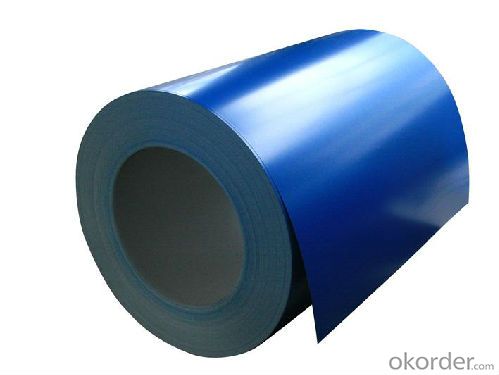
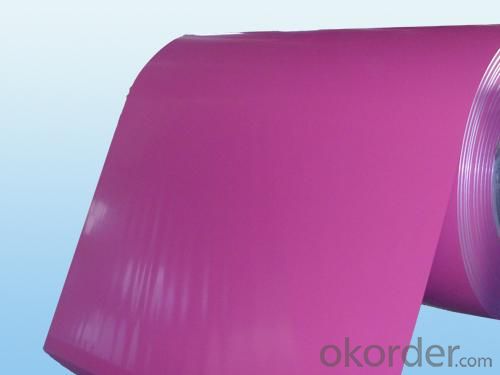
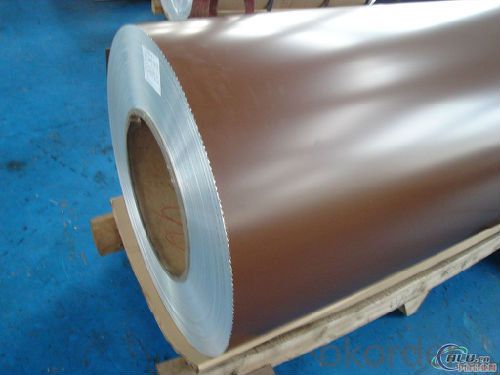
4.Product Specification
| Alloy | Temper | Coating Thickness | Painting | Coil ID | Coil Weight |
| AA3003 | H14 | 22-25 MICRON | PE&PVDF | 505MM | MIN 2 TONS |
5.FAQ:
What is the quality standard?
---Usually our standard is GB3880-2006
What is the largest width?
---It is 2300mm
What is the MOQ?
---Usually we can accept 5 tons.
- Q: Are aluminum coils suitable for outdoor signage and displays?
- Indeed, outdoor signage and displays can indeed benefit from the use of aluminum coils. The reason for this is that aluminum is a material known for its exceptional durability and resistance to weather conditions, which makes it an ideal choice for outdoor applications. Its ability to withstand extreme temperature fluctuations, UV rays, moisture, and corrosion is well-known. Moreover, aluminum coils possess the advantage of being lightweight, yet still offering considerable strength, making them easy to handle and install. Furthermore, their versatility allows for easy shaping and forming into various sizes and designs. Additionally, aluminum boasts excellent printability, ensuring vibrant and long-lasting graphics. In summary, aluminum coils present a dependable and cost-effective solution for outdoor signage and displays.
- Q: Are there any limitations to the coil weight of aluminum coils?
- The coil weight of aluminum coils is subject to limitations. The primary factor that restricts the coil weight is the capacity of the equipment used for handling and transporting the coils. Different machinery and materials handling systems have varying weight capacities. Exceeding these capacities can result in safety hazards and equipment damage. Furthermore, the size and dimensions of the coils also affect the maximum weight limit. Larger coils generally have a higher weight limit because they possess a larger surface area to distribute the load. Nonetheless, regardless of coil size, there is a practical limit to the weight that the machinery and equipment can bear. Additionally, the coil weight limit is influenced by the strength and integrity of the material used. Aluminum, being a lightweight material with a high strength-to-weight ratio, allows for larger coil weights compared to other materials. However, excessive weight may cause deformation or damage to the coil, impacting its quality and usability. It is essential to take these limitations into consideration and adhere to the manufacturer's recommendations and industry standards when determining the maximum coil weight. Following proper handling, storage, and transportation procedures is crucial to ensure the safety of personnel and the integrity of the aluminum coils.
- Q: Can aluminum coils be used in the production of electrical cables?
- Yes, aluminum coils can be used in the production of electrical cables. Aluminum is a widely used material in the electrical industry due to its excellent electrical conductivity and lightweight properties. Aluminum coils are commonly used to manufacture power cables, building wires, and other electrical conductors. They have been proven to be a cost-effective alternative to copper coils, which are more expensive but possess higher electrical conductivity. The use of aluminum coils in electrical cables can help reduce the overall weight of the cables, making them easier to install and handle. Additionally, aluminum coils have good corrosion resistance, making them suitable for outdoor and underground applications. However, it is important to note that aluminum has a lower tensile strength compared to copper, so proper design considerations and installation techniques must be taken into account to ensure the longevity and reliability of aluminum-based electrical cables.
- Q: How are aluminum coils protected against damage during handling?
- Aluminum coils are protected against damage during handling through various methods and precautions. Firstly, they are usually wrapped in a protective layer, such as plastic or paper, to provide a barrier against any physical contact or scratches. This protective wrapping also helps prevent moisture or dirt from coming into direct contact with the coils. Additionally, aluminum coils are often secured onto pallets or placed inside crates for added protection during transportation. These pallets or crates act as a buffer, absorbing any shocks or impacts that may occur during handling or shipping. This reduces the risk of dents, bends, or other forms of damage that could compromise the integrity of the coils. Furthermore, proper handling techniques are employed to ensure the coils are not mishandled or dropped. Forklifts or cranes are commonly used to lift and move the coils, minimizing the risk of human error or accidental damage caused by manual handling. Overall, a combination of protective wrapping, secure packaging, and careful handling practices are implemented to safeguard aluminum coils against potential damage during their transportation and handling processes.
- Q: What specific conditions or considerations need to be taken into account when utilizing aluminum coils in high-temperature settings?
- <p>When using aluminum coils in high-temperature environments, it's crucial to consider the material's melting point, which is around 660掳C (1220掳F). Ensure that the operating temperature does not exceed this threshold to avoid deformation or failure. Additionally, aluminum's strength and conductivity can be affected by high temperatures, so it's important to account for potential changes in performance. Protective coatings or treatments may be necessary to prevent oxidation and maintain the coil's integrity. Always consult material specifications and consult with material science experts to determine the suitability of aluminum coils for specific high-temperature applications.</p>
- Q: if the resistivity of aluminium is 2.7×10-8 Ωm
- Let ρ be the resistivity of the aluminum cable, A the cross sectional area of the cable and l the cable's length. The resistance R of the aluminum cable is now given by: R = ρ·l / A = 2.7·10^-8·(10·10^3) / (π·r?) = 2.7·10^-8·(10·10^3) / (π·(1·10^-3)?) = 85.9 Ω I guess the tricky part is remembering: R = ρ·l / A but when you realize how intuitive this equation is you don't have to memorize it. The resistance R is proportional to the resistivity ρ, so we must have the following in our equation: R = ρ·k , where k is some value governed by the dimensions of the cable! It is logical that the resistance is also proportional to the wires length l. This is logical when you realize that the longer the wire the more obstacles the electrons will have to pass by! Now we have that: R = ρ·l·c , where c is another value governed now by the cross sectional area (only dimensional property left). If we think of the wire as a highway with cars instead of electrons we realize that there is less resistance (higher speed) when the highway has many lanes and is very broad. From this we realize that the greater the cross sectional area the smaller the resistance. R must therefore be inversely proportional to A. We now have: R = ρ·l / A I hope there are no mistakes here :P
- Q: What are the various surface finishes available for aluminum coils?
- Aluminum coils offer a variety of surface finishes to meet different needs and preferences. The options include: 1. Mill Finish: This is the most basic and natural finish achieved by passing the coil through rollers during manufacturing. It gives the aluminum a smooth, shiny appearance. 2. Anodized Finish: Anodizing is an electrochemical process that adds a protective layer to the aluminum coil's surface. It comes in various colors and provides enhanced resistance to corrosion, abrasion, and wear. Architects commonly use anodized finishes. 3. Painted Finish: Aesthetic appeal and environmental protection can be achieved by coating aluminum coils with paint. The paint comes in different colors and finishes, such as matte, glossy, or metallic. 4. Brushed Finish: By brushing the surface with abrasive materials, aluminum coils can have a textured appearance with fine lines or scratches. Brushed finishes are often used for decorative purposes. 5. Polished Finish: Buffing the surface of the aluminum coil creates a smooth, reflective finish. It gives a mirror-like appearance and is commonly used for decorative and architectural applications. 6. Embossed Finish: Embossing involves stamping or pressing a pattern or design onto the surface of the aluminum coil. This finish adds texture and depth, making it suitable for non-slip surfaces or decorative purposes. 7. Laminated Finish: Lamination involves bonding a thin layer of film or foil to the aluminum coil's surface. This finish provides additional protection against scratches, stains, or UV radiation. It is commonly used for applications that require durability and resistance. These examples highlight the range of surface finishes available for aluminum coils. The choice of finish depends on specific application requirements, desired appearance, and functional properties needed for the end product.
- Q: Can aluminum coils be used in heat exchangers?
- Yes, aluminum coils can be used in heat exchangers. Aluminum is commonly used in heat exchanger applications due to its excellent heat transfer properties, lightweight nature, corrosion resistance, and cost-effectiveness.
- Q: What are the different available coil weights for aluminum coils?
- The available coil weights for aluminum coils vary depending on several factors such as the thickness, width, and alloy of the aluminum. Generally, the coil weights for aluminum coils range from a few hundred pounds to several thousand pounds. For thinner gauge aluminum coils, the coil weights typically range from 1,000 to 5,000 pounds, while for thicker gauge coils, the weights can go up to 20,000 pounds or more. The specific coil weight options also depend on the capabilities and specifications of the manufacturer or supplier. It is recommended to consult with the manufacturer or supplier to determine the exact range of available coil weights for the desired aluminum coils.
- Q: i dont want aluminum cookware, but how about a stainless steel set with an aluminum core. Is this the same as aluminum pots and pans? Thanks.
- The aluminum is encased in the stainless steel, usually as a thick disk in the bottom. It is an excellent conductor of heat and holds the heat well once it gets hot. All you see is the stainless, none of the aluminum because it's between two layers of stainless in the bottom of the pots. You are right, you don't want food cooked in straight aluminum, some metal taste can transfer to certain foods. That won't happen with stainless.
Send your message to us
Custom Aluminum Coil - PE Color Coated Aluminium Coil AA3003 H14
- Loading Port:
- China Main Port
- Payment Terms:
- TT or LC
- Min Order Qty:
- -
- Supply Capability:
- -
OKorder Service Pledge
OKorder Financial Service
Similar products
Hot products
Hot Searches
Related keywords
